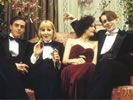Eye For Film >> Movies >> Bright Young Things (2003) Film Review
The idle rich could have gone on being rich and idle without ever stirring the envy of the working classes if it wasn't for the invention of the gossip column. Now, in the 21st century, that position has been taken over by celebrity magazines and entire newspapers. Suddenly, gossip is news.
Evelyn Waugh's biting satire Vile Bodies was an attack on Lord Beaverbrook and everything he stood for, while purporting to be a playful romantic comedy about the bright young things of the late Thirties and what silly asses they were.

First time director Stephen Fry has adapted the novel for the screen, with an understanding and accuracy that is remarkable. In past adaptations, Waugh's characters could have swapped places with Bertie Wooster's chums, as if the English aristocracy consisted entirely of ancient eccentrics and frightfully nice, impoverished younger sons, endeavouring to marry heiresses, often by deception, in order to pay their bar bills.
The period of the film is 1939, with storms of war threatening from across the Channel, not that these night owls would notice, as party follows party, each more elaborate and foolish than the one before.
"I'm so bored, dahling," is a cry often heard from the scarlet lips of dizzy debutantes.
Within this charmed clique, not much is happening ("Are you going to spend your time eating plovers' eggs and sucking up cocktails?"). The talk of love is no more serious than the snippets of rumour published in Mr Chatterbox's column in The Daily Excess.
Where Fry succeeds so well is allowing the intrinsic innocence of these brittle butterflies to be exposed without mockery. The itinerant writer Adam (Stephen Campbell Moore) has decided to take his girlfriend Nina (Emily Mortimer) to an hotel in Sussex for a night of passion, obviously their first, and the dialogue is delicately balanced.
"Am I going to be seduced?" she asks, with a flirtatious twinkle in her eye, disguising the fear.
"I am afraid you are," he replies, in earnest. "Do you mind terribly?"
This is neither gauche, nor coy. It is the way things were, as if emotions had been locked in cupboards by Nanny a long time ago and needed permission to be released.
The star-studded cast is dazzling, with particular mention of Fenella Woolgar, Michael Sheen and David Tennant. It seems difficult to avoid Mortimer these days - last week it was Young Adam - which is no hardship whatsoever. Her portrayal of Nina has layers of subtlety and, like a moth in amber, captures the intransigence of a petrified society perfectly.
The revelation is newcomer Campbell Moore. He fits into the tapestry of this world of privileged ignorance as if born to it. Adam is different from the others, in the sense that his father is an academic and he's written a novel (unpublished). Without indulging public school mannerisms, or exaggerating a single vowel, Campbell Moore captures the character of Waugh's enigmatic anti-hero with an uncanny instinct. It is an astonishing debut, as assured and natural as Fry's.
Reviewed on: 02 Oct 2003




















